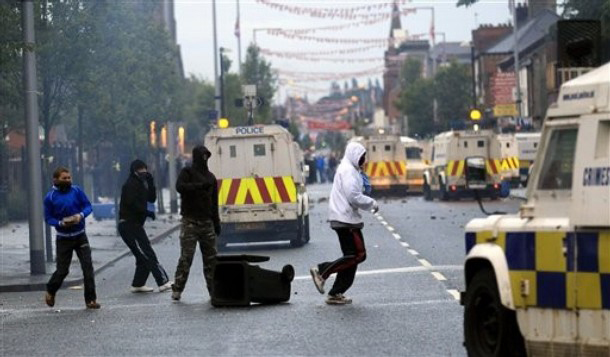
This year’s loyalist marching season has seen intense street fighting across the north of Ireland as thousands of unionists took part in their annual display of supremacy intended to intimidate the nationalist minority. It started on 20 June when hundreds of loyalists attacked nationalist residents in the Short Strand area of East Belfast. Images of the subsequent street disturbances, which involved running street battles, were broadcast around the world, belying the image which is normally projected of a society at peace. On 12 July, nationalists in north Belfast faced police attack for opposing a supremacist loyalist march through Ardoyne. Other disturbances took place in Derry, Craigavon and Portadown where nationalist residents came under attack from members of the Police Service of Northern Ireland (PSNI). In Portadown, immigrant families from East Timor fled a nationalist area after experiencing a racist loyalist attack.
The assault on Short Strand is symbolically significant as it was here in 1970 that the Provisional IRA emerged as the only effective defender of the nationalist minority against similar loyalist violence. This year hundreds of masked men, some wearing crash helmets, camouflage clothing and surgical gloves, launched co-ordinated attacks on the Short Strand enclave. One nationalist was hospitalised with a fractured skull as petrol and smoke bombs, fireworks, bricks and stones were used in two days of intense rioting.
The PSNI at first claimed that the Short Strand onslaught had been ‘spontaneous disorder’. In reality there was nothing spontaneous about it. It was a highly coordinated attack organised by the Ulster Volunteer Force (UVF), whose representatives had been briefing journalists for weeks during the build-up that such an event was likely as loyalist demands for greater subsidies from British imperialism were not being met. The riots were also intended to send a clear message from organised loyalism that the Historic Enquiries Team should back off from investigating too deeply the hundreds of unsolved killings which involved members of the UVF in their terror campaign directed at the Catholic minority.
Paul Mallon




